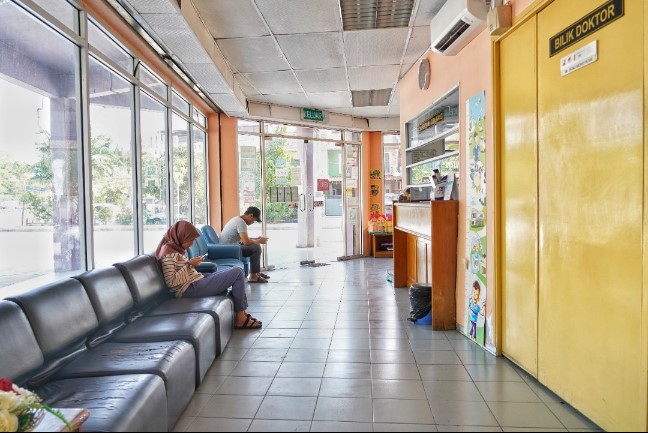KUALA LUMPUR, Nov 10 — Health analysts want Budget 2021 to have more allocations for non-communicable diseases (NCDs), digital health investment, and greater resources to tackle Covid-19.
Two professors from the School of Pharmacy at Monash University — June Choon, who is a lecturer and health economics researcher and Kenneth Lee, a professor of pharmacy — told CodeBlue that the federal budget, which is now being debated in Parliament, should focus on NCDs, especially cancer.
The pointed out that the National Health and Morbidity Survey 2019 clearly showed the prevalence of NCDs that are on the rise and that the burden of disease cost is estimated to be around RM100.79 billion, equivalent to 7.37 per cent of the gross domestic product (GDP).
“Every disability and premature death from NCDs can be prevented,” Choon and Lee said. “There will be a significant impact to public health and the economy if we fail to manage NCDs in the country.”
The pharmacy professors also pointed out that in cancer treatment, funding does not only help patients, but also helps them to live their lives.
“We must not forget the opportunity costs (such as increase in non-Covid deaths because of reduced use of health services and delays in treatment of other diseases) arising from the Ministry of Health (MOH) prioritising resources on Covid-19.”
June Choon and Kenneth Lee, professors from the School of Pharmacy at Monash University
It was noted by CodeBlue when Budget 2021 was tabled in Parliament last Friday that public health and nearly all health care services under MOH had their budgets slashed, including nephrology, cardiothoracic, oncology, general medicine, and so on. The 2021 budget for MOH’s public health programme was cut by 11.7 per cent.
The budget for radiotherapy and oncology was slashed by 58.49 per cent from RM328.7 million to RM136.4 million, while nephrology, which deals with patients undergoing haemodialysis due to kidney disease, had a budget cut of 77.61 per cent.
MOH then released a statement saying that there has been no decrease in the Budget 2021 allocation for drugs and supplies for various programmes, including medical and public health. Instead, funding for drugs and supplies across MOH programmes were consolidated into two new lump sums under Specific Programmes worth RM4.29 billion, comprising RM2.89 billion for health facilities’ medical supplies and RM1.4 billion in financial commitment for private concession of medical laboratories and stores.
In 2020, these lump sums were budgeted as medical supplies in each respective programme separately: medical, public health, pharmacy services, and dental. Health Minister Dr Adham Baba told CodeBlue that the lump sum allocation was made to enable comprehensive monitoring of allocation and expenditure of all MOH health facilities.
MPs, including Opposition Leader Anwar Ibrahim, had questioned the government’s decision on consolidating the budget for medical supplies, while describing Budget 2021 as a misleading budget and with manipulation of figures.
“Ada celah sana, celah sini. Disorok sana, disorok sini,” Anwar said in his debate on Budget 2021 in Parliament on November 9. [Translation: There is a gap here and there. Hidden there, hidden here].
He also warned the government that the Opposition may not support Budget 2021 if it was not a true Covid-19 budget. The Perikatan Nasional administration has a razor-thin majority in the Dewan Rakyat.
Former Health Minister Dzulkefly Ahmad also questioned the government’s decision to shift MOH’s operational allocations to development expenditure.
Bandar Kuching MP Dr Kelvin Yii, who is a trained medical practitioner, said that reclassifying the allocations for treatments under highly discretionary “specific programmes” would lead to bureaucracy and extra paperwork, while he also questioned on how each clinical department would apply for the funds and who would make funding decisions.
Government Should Decide On How To Prioritise Covid-19 Vaccine Targets

The two professors from Monash University Malaysia acknowledged the government’s efforts in allocating a separate budget in procuring a Covid-19 vaccine, especially through the participation of the government in the Covid-19 global vaccine access (COVAX) programme, but asked the government to decide on how to set priority on who should be vaccinated first.
“We applaud the government’s commitment to acquire Covid-19 vaccines supplies, including through participation in the Covid-19 vaccine global access (COVAX) program,” the professors said.
“How to set priority of people receiving the Covid-19 vaccine in order to avoid a standstill on the livelihood of the most vulnerable group.”
Finance Minister Senator Tengku Zafrul Aziz said in his Budget speech last Friday that there has been a RM3 billion budget allocation for the government to procure Covid-19 vaccines for the public. However, Anwar has questioned the whereabouts of the Covid-19 vaccine allocation in Budget 2021.
MOH said yesterday that the RM3 billion Covid-19 vaccine allocation was not under its budget, while the Ministry of Science, Technology and Innovation was only allocated a budget of below RM1 billion. The Temporary Measures for Government Financing (Coronavirus Disease 2019) Act 2020, which governs the RM45 billion Covid-19 Fund, also does not list a Covid-19 vaccine among its allocations from the fund.
Minister of Science, Technology, and Innovation Khairy Jamaluddin had previously said that frontliners will be given priority in getting vaccinated against Covid-19. In a tweet on November 7, the minister said that he will be announcing a national Covid-19 immunisation plan early next year, including a clear communication on the safety of the vaccine.
More Investment Into Digital Health

Choon and Lee from Monash University also called on the government to invest more into digital health solutions, as this pandemic has accelerated the adoption of digital technology of various sectors, including health care.
“More than ever, we need to leverage existing work, coordinate capacity, and integrate successful initiatives into the health care system,” the analysts said in a joint comment on Budget 2021.
“Augmenting the scale of digital health will lead to more collaborative endeavours and sharing of resources–both data, technical, and expertise.”
“It is critical for the government to build on this momentum to support an even greater adoption of new digital health technologies,” Choon and Lee said.
No Allocations For Permanent Employment Of Contract Officers

Malaysian Medical Association (MMA) president Dr Subramaniam Muniandy expressed his disappointment with Budget 2021, saying it did not acknowledge the issue of permanent and contract positions for junior health care workers.
“Amongst the disappointments that we have seen is the lack of acknowledgment to the long standing issues regarding the permanent and contract positions for junior healthcare workers,” Dr Subramaniam said.
“Overall we agree that the budget is focused on rejuvenating the economy, but to the medical profession, it does seem that despite the applause given to the frontliners, there still could be more to be done to address the needs of our fraternity.
“It is hoped that the government will be clearer on the employment of new doctors in permanent positions,” the MMA president said.
Health Minister Dr Adham Baba, who had a press conference shortly after the Budget was tabled, said that the government has agreed to implement salary adjustments for contract medical officers from grade UD41 to UD43. At the same time, he said that the ministry is also planning to absorb the contract officers as permanent officers after the salary adjustment is carried out.
Besides that, he said that the government is planning to send local medical officers to serve in England, while saying that the terms and conditions for the programme were being discussed, Free Malaysia Today reported.
Currently, doctors during their housemanship are given the civil service grade of UD41. Upon completion of their housemanship, they become medical officers with the same grade of UD41. This means their grade is the same as a house officer with a salary lesser than a house officer because medical officers don’t get the RM600 flexi allowance that house officers get.
Moreover, a UD41 grade medical officer also gets an annual income of RM7,968 per year less than their UD44 permanent medical officer counterparts, besides not being able to apply for specialisation programmes.
General Practitioners Repeatedly Sidelined

Dr Subramaniam also pointed out that the government has not listened to MMA’s request to include the 7,000 GPs across the nation in fighting the pandemic.
“Another forgotten group is the GPs who have been sidelined repeatedly during the management of the pandemic,” Dr Subramaniam said.
“The MMA had proposed for tax breaks and incentives to encourage and include the 7,000 GPs in the fight for the pandemic, but again these calls were not heeded. The GPs are also going through a tough time during this period. They should be supported by allowing tax relief of indemnity insurance,” the president of MMA said.
Dr Subramaniam previously told CodeBlue that about 200 GP clinics will be closed by the end of 2020 because they have been affected by the coronavirus pandemic. Hence, during their Budget 2021 wishlist, they had asked the government for higher tax rebates, as well as for the government to recognise GPs as an extension of the public health service.








